Report on the 2019 Sacramento Visit
JBA, together with the Japanese Chamber of Commerce Northern California (JCCNC), visits the state capital Sacramento every year. This year, they conducted their visit on June 19th and 20th, and appealed the “contribution level of Japanese companies to the state of California” to several agencies of the state government, including state legislators. While promoting relations with key organizations, they held talks that focused on finding solutions to issues JBA member companies face when conducting business activities, making it a productive visit.
‹Itinerary›
June 19 (Wednesday)- Meeting with Assemblymember Al Muratsuchi
- Meeting with the California Department of Motor Vehicles (DMV)
- Meeting with the California Governor’s Office of Business and Economic Development (GO-Biz)
- Visit to the California Senate (in session)
- Meeting with California Governor’s Office of Emergency Services (Cal OES)
- Meeting with California Senator Scott D. Wiener
- Visit with California Senator Robert Hertzberg/Luncheon meeting with the California Chamber of Commerce (CalChamber)
- Visit with Miyamoto International, Inc.
California Legislature
Meeting with Assemblyman Al Muratsuchi
JBA’s Sacramento delegation took the time to talk with Al Muratsuchi, who represents the state’s 66th Assembly District and is the sole Japanese American California state legislator. They brought with them again this year the report on “Foreign Direct Investment in Southern California 2019” prepared by WTCLA (The World Trade Center Los Angeles), a subsidiary of LAEDC (Los Angeles County Economic Development Corporation), and explained that the scale of investment, number of employment and average wage that Japanese companies generated in the California remained higher than any other country doing business in the region.
In addition, Assemblyman Muratsuchi explained that the State of California used to have an office in Tokyo to attract Japanese companies which closed during Governor Brown’s term, and expressed his willingness to reopen it.
Meeting with the California Department of Motor Vehicles (DMV)
In a meeting with the California Department of Motor Vehicles, the delegation met with four executives appointed under the new governor. They discussed a wide range of topics including California’s infrastructure development, issuance of REAL IDs required for security inspections at airports and federal facilities from October 2020, testing of self-driving cars, expanding the Zero-Emission Vehicle program, as well as problems faced by expatriates from Japan when obtaining their driver’s licenses. It was also confirmed that inquiries regarding the issuance of driver’s licenses from Japanese company members, which is an important issue, will continue to be handled individually.
Meeting with the Governor’s Office of Business and Economics Development (GO-Biz)
The basic policies and activities for economic promotion outlined by Gavin Newsom, who became the new governor of California this year, can be summarized into the following 5 items: A) expanding international trade, B) focusing on climate change and global warming, C) expanding exports and direct investment D) supporting the spread of zero-emission vehicles (ZEV), particularly focusing on infrastructure development, and E) discussing the pros and cons surrounding changes in the labor environment brought on by Artificial Intelligence (AI).
GO-Biz considers attracting companies and creating jobs as one of its major duties, and offers an income tax incentive system called “California Competes Tax Credit” to companies that have made a foray into California or have been operating in the state for many years. It also provides information and support services for securing labor force to companies wishing to relocate or expand offices in the state. The cost of operating a business in California, one of the highest in the nation, has become problematic, especially with the deterioration of housing conditions (rising real estate prices and rents, severe housing shortages) and is recognized as the biggest barrier in doing business in the state. While the governor approved a $17 billion special housing budget this January, it is only temporary, and he appealed not only for the development of infrastructure to build more houses but also for the need for considerable cooperation from the business world.
As of July 2018, there are currently about 500,000 ZEVs being sold and 7,000 charging stations (20,600 charge points), with 48 different models available. JBA took notice on the point that GO-Biz made about supporting not only electric vehicles but also hydrogen vehicles. The state government has publicly committed to support both technologies at this point in time, which appears to be good news for companies involved in hydrogen vehicle development.
Meeting with California Governor’s Office of Emergency Services (Cal OES)
Cal OES Director Abby Browning is responsible for contacting businesses, nonprofits, universities and communities in the event of a disaster as the Chief of Office Private Sector. In the event of an evacuation, the contact information for evacuation procedures and such will be under the jurisdiction of the county sheriff. As information is drawn out by Cal OES during times of disaster, it can be used as an information source or a place for consultation by local businesses from when disaster strikes to recovery. In addition, it was explained that Cal OES could provide statewide companies various types of training such as emergency management, public safety, and disaster recovery through the CA Specialized Training Institute, and that each company should constantly be prepared for these types of situations.
Meeting with Senate Majority Leader Robert Hertzberg and Senator Scott Wiener
Despite the fact that a senate meeting was in session, the delegation was able to meet with California Senate Majority Leader Robert Hertzberg and California Senator Scott Wiener. When JBA specifically appealed the contribution of Japanese companies to the state’s economy and job creation, referring to the Foreign Direct Investment report, both legislators expressed their gratitude towards Japanese businesses. Wiener admitted that there wasn’t much awareness in such contributions and that Japanese companies were not receiving the treatment they deserve for their achievements.
In the state of California, in addition to the importance of increasing housing as the population grows, there are many other issues such as transportation, water shortages, and the recycling and conservation of water. Regarding these issues, there was talks about working closely with the new governor moving forward. Furthermore, they stated that they learned a lot about Japan’s housing conditions from their visit to the country.
Meeting with the California Chamber of Commerce
A lunch meeting was organized by the California Chamber of Commerce (CalChamber), in which Governor Newsom’s international policies, labor shortages in California, environmental regulations, the relocation of Japanese companies outside of the state, and the recognition of Japanese companies’ contributions were discussed. CEO Allen Zaremberg said, “On one hand California has prospered to the fifth largest economy in the world. On the other, labor costs have risen due to the rising costs of living, including rent and housing prices, while the unemployment level remains at a record low, making it difficult to secure the best talent with the ideal salary.” Nonetheless, as the state is a center of research and development and boasts many world-class educational institutions, there are lots of attractive talent that have been highly educated at these institutions, thus remains an appealing place for many companies.
Regarding the recognition level of Japanese companies’ contributions to California’s economy and employment, it was advised that it was important to keep reiterating this fact since politicians change frequently, and that it would be effective to create a visual map that shows where Japanese companies are investing and creating jobs in order to make it known to more people.
Lastly, it was explained that CalChamber’s priorities are: 1) alleviate the housing shortage by increasing housing, 2) revise the California Consumer Privacy Act (CCPA), 3) support business people in the state through lobbying (employment law, environmental regulation law, energy policy, etc.).
Talks with Miyamoto International, Inc.
Miyamoto International, Inc., while not a state government agency, has an established reputation for earthquake research and seismic design technology as an architectural design office, and actively exchanges information with Cal OES. During this visit, Dr. Nifuku spoke about each fault in California and how to recover from earthquake damage. He explained that for basic crisis management, it is important to think about each of the following aspects: 1) mitigation, 2) preparation, 3) response, and 4) recovery. However, since it is difficult to reduce the damage to zero in a major disaster, he stated that it was better to shorten recovery time rather than trying to aim for zero damage as it is most effective to maintain resiliency.
JBA will continue to strengthen the relationship and dialogue with the legislators and government agencies that we met with this time, and will continue to work to ensure that member companies enjoy meaningful information and benefits.
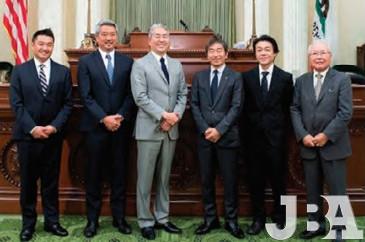 Delegation group photo with Assemblyman Muratsuchi (third from left) and JBA President Kiichi Nakajima (center)
Delegation group photo with Assemblyman Muratsuchi (third from left) and JBA President Kiichi Nakajima (center)
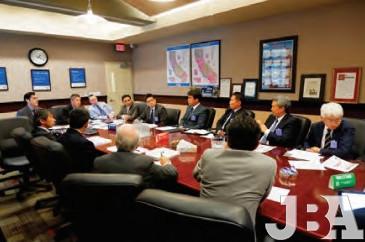 Meeting with the DMV. Individual inquiries regarding driver’s licenses, which are important issues for JBA members, were confirmed.
Meeting with the DMV. Individual inquiries regarding driver’s licenses, which are important issues for JBA members, were confirmed.
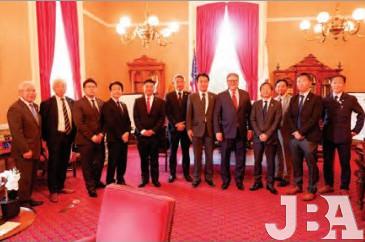 With California Senate Majority Leader Hertzberg
With California Senate Majority Leader Hertzberg
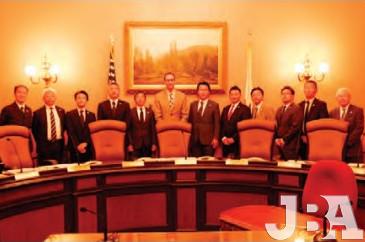 With California Senator Wiener
With California Senator Wiener
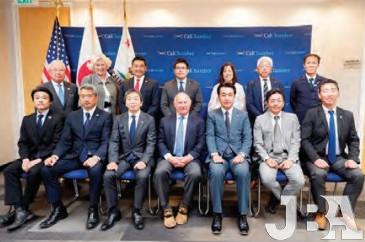 At CalChamber, where advice for raising awareness of the contribution of Japanese companies to California’s economy and employment was obtained
At CalChamber, where advice for raising awareness of the contribution of Japanese companies to California’s economy and employment was obtained

